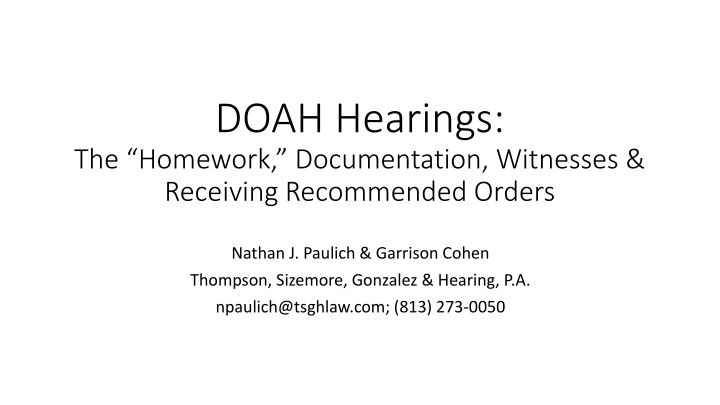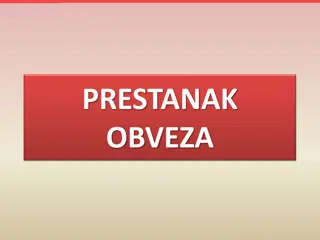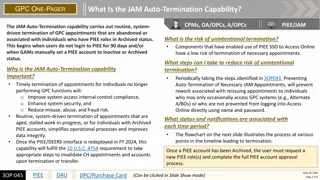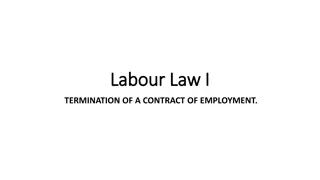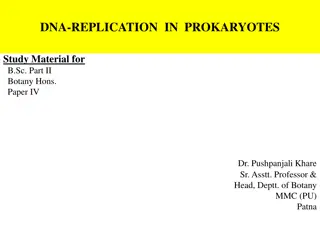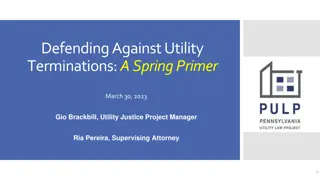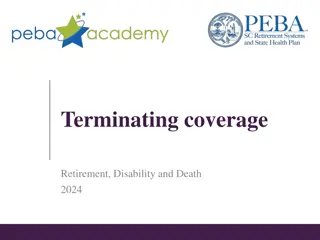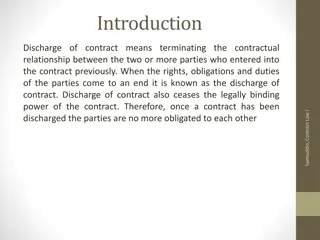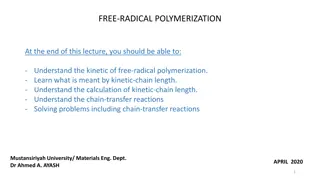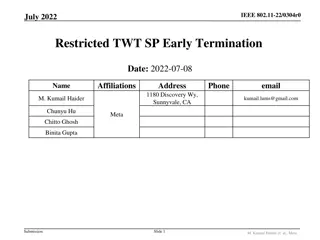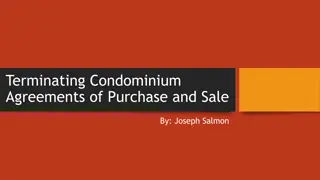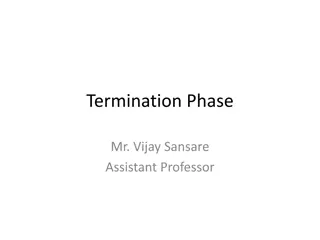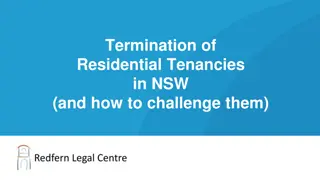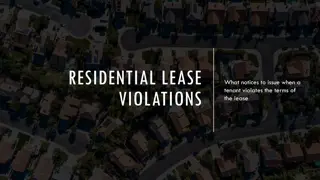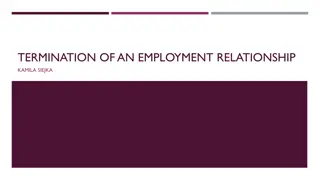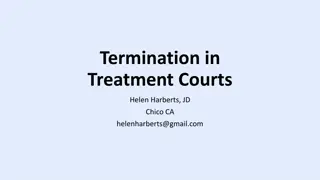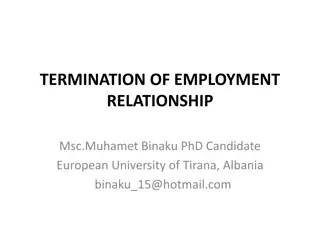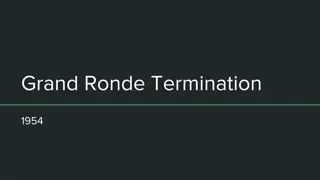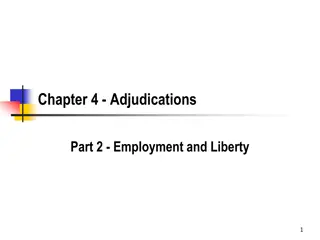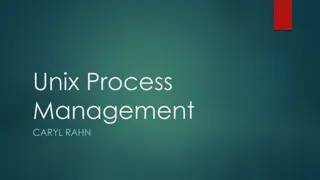Overview of Termination Procedures in Educational Organizations
Explore the termination procedures for instructional personnel and educational support employees, including just cause criteria, annual contract renewal guidelines, appeal processes, and administrative hearings. Learn about the grounds for termination, potential outcomes, and the role of superintendents and school boards in the termination decision-making process.
Download Presentation

Please find below an Image/Link to download the presentation.
The content on the website is provided AS IS for your information and personal use only. It may not be sold, licensed, or shared on other websites without obtaining consent from the author.If you encounter any issues during the download, it is possible that the publisher has removed the file from their server.
You are allowed to download the files provided on this website for personal or commercial use, subject to the condition that they are used lawfully. All files are the property of their respective owners.
The content on the website is provided AS IS for your information and personal use only. It may not be sold, licensed, or shared on other websites without obtaining consent from the author.
E N D
Presentation Transcript
DOAH Hearings: The Homework, Documentation, Witnesses & Receiving Recommended Orders Nathan J. Paulich & Garrison Cohen Thompson, Sizemore, Gonzalez & Hearing, P.A. npaulich@tsghlaw.com; (813) 273-0050
Just Cause Instructional Just cause includes, but is not limited to: Immorality, misconduct in office, incompetency; Two consecutive annual performance evaluation ratings of U; Two annual performance evaluation ratings of U within a 3-year period; Three consecutive annual performance evaluation ratings of NI or a combination of NI and U; Gross insubordination, willful neglect of duty, or being convicted or found guilty of, or entering a plea of guilty to, regardless of adjudication of guilt, any crime involving moral turpitude.1 Annual contract will not be renewed/awarded if the employee evaluations fall below above standards.2 1. 1012.33(1)(a), Fla. Stat. (2017); 1012.335(5), Fla. Stat. (2017) 2. 1012.335(2)(b)-(c), Fla. Stat. (2017)
Just Cause Instructional: 2011 - Present Any instructional personnel with an annual contract may be suspended or dismissed at any time during the term of the contract for just cause. 2 Alternative to termination: non-renewal of annual contract. Annual contract means an employment contract for a period of no longer than 1 school year which the district school board may choose to award or not award without cause. (emphasis added). The Superintendent must first recommend the individual for the annual contract. An individual newly hired as instructional personnel by a school district in this state under this section is ineligible for any contract under s. 1012.33. 3 2. 1012.335(4), Fla. Stat. (2017) 3. 1012.335, Fla. Stat. (2017); see also Gabriele v. Sch. Bd. Of Manatee Cty., 114 So.3d 477, 480 (Fla. 2d DCA 2013)
Just Cause: Educational Support Employees The Superintendent can recommend termination of educational support employees for reasons stated in the collective bargaining agreement or in the district school board rules if no collective bargaining agreement exists.6 In the event a district school superintendent seeks termination of an employee, the district school board may suspend the employee with or without pay. The employee shall receive written notice and shall have the opportunity to formally appeal the termination. 7 6. 1012.40(2)(b), Fla. Stat. (2017) 7. 1012.40(2)(c), Fla. Stat. (2017)
Just Cause : Appeal to Hearing Employee s right to administrative hearing. If the employee wishes to contest the charges, the employee must, within 15 days after receipt of the written notice, submit a written request for a hearing. Such hearing shall be conducted at the district school board's election in accordance with one of the following procedures. Those procedures include, among others, a hearing conducted by an administrative law judge assigned by DOAH. The hearing shall be conducted within 60 days after receipt of the written appeal.8 Educational Support Employees The appeals process shall be determined by the appropriate collective bargaining process or by district school board rule in the event there is no collective bargaining agreement. 9 8. 1012.33(6)(a)2., Fla. Stat. (2017); see also 1012.335(4), Fla. Stat. (2017) 9. 1012.40(2)(c), Fla. Stat. (2017)
Discipline Hearings & Burden of Proof School board employee discipline hearings under the Florida Administrative Procedures Act ( APA ).10 The School Board bears the burden of proving, by a preponderance of the evidence, just cause exists for the discipline.11 The School Board therefore goes first, and has an opportunity for rebuttal. Preponderance of evidence is defined as evidence which as a whole shows that the fact sought to be proved is more probable than not. 12 10. 120.57(1)(j), Fla. Stat. (2017) 11. McNeill v. Pinellas Cty. Sch. Bd., 678 So. 2d 476, 477 (Fla. 2d DCA 1996); 120.57(j), Fla. Stat. (2017) 12. Dufour v. State, 69 So. 3d 235, 252 (Fla. 2011)
Administrative Hearing: Procedure Overview Hearings are conducted by the Division of Administrative Hearings (DOAH) A formal hearing is conducted with an Administrative Law Judge (ALJ) Prior to the hearing, the parties may take formal discovery. The ALJ may also enter pre-hearing orders. After the formal hearing, the ALJ issues a recommended order that the school board may adopt as its final order.13 13. 120.57(1)(k), Fla. Stat. (2017)
Administrative Hearing: Rights and Procedures DOAH hearing ALJ, employee, District representative, lawyers, court reporter, witness. All parties shall have an opportunity to: respond, present evidence and argument on all issues involved, conduct cross-examination and submit rebuttal evidence, submit proposed findings of facts and orders, file exceptions to the presiding officer s recommended order, and be represented by counsel or other qualified representative.15 Hearsay evidence is permissible in a DOAH hearing, but standing alone cannot be the basis for a finding of fact.16 15. 120.57(1)(b), Fla. Stat. (2017) 16. 120.57(1)(c), Fla. Stat. (2017)
Hearing Officer: Administrative Law Judge ALJ oversees the hearing. ALJ s role is to determine: Findings of fact Conclusions of law Recommended discipline or actions 14. 120.57(1)(a), Fla. Stat. (2017)
Proposed Recommended Order Each party may submit a post-hearing recommended order.16 Includes: findings of fact, conclusions of law, orders, and memoranda on the issues before the ALJ.17 The ALJ designates the time allotted to submit the proposed recommended order.18 Limited to 40 pages.19 16. Fla. Admin. Code R. 28-106.215 17. Id. 18. Id. 19. Id.
ALJs Recommended Order Must be filed 30 days from the latter of the conclusion of the hearing or the receipt of the hearing s transcript.21 NOTE: 30 day requirement is waived if the parties agree to submit proposed recommended orders more than 10 days after the close of the hearing.22 School Board receives the ALJ s recommended order within 15 days.23 Recommended order consists of: Findings of fact Conclusions of law Recommended disposition or penalty. 21. Fla. Admin. Code R. 28-106.216(1) 22. Fla. Admin. Code R. 28-106.216(2) 23. 120.75(1)(m), Fla. Stat. (2017)
Recommended Order: Standards and Deference Findings of fact Must be based on competent substantial evidence. Findings of fact must be based upon competent substantial evidence and the proceedings on which the findings were based must comply with essential requirements of law. 24 Most deference given to ALJ The agency may not reject or modify the findings of fact unless the agency first determines from a review of the entire record, and states with particularity in the order, that the findings of fact were not based upon competent substantial evidence or that the proceedings on which the findings were based did not comply with essential requirements of law. 24. 120.57(1)(l), Fla. Stat. (2017)
Recommended Order: Standards and Deference Conclusions of law The school board may reject or modify the conclusions of law over which it has substantive jurisdiction and interpretation of administrative rules over which it has substantive jurisdiction. Some Deference When rejecting or modifying such conclusion of law or interpretation of administrative rule, the school board must state with particularity its reasons for rejecting or modifying such conclusion of law or interpretation of administrative rule and must make a finding that its substituted conclusion of law or interpretation of administrative rule is as or more reasonable than that which was rejected or modified. Rejection or modification of conclusions of law may not form the basis for rejection or modification of findings of fact.25 25. 120.57(1)(l), Fla. Stat. (2017)
Recommended Order: Standards and Deference Recommended disposition or penalty. Within the School Board s discretion to accept, reject, or modify after a complete review of the record.26 Least Deference The School Board may accept the recommended penalty in a recommended order, but may not reduce or increase it without a review of the complete record and without stating with particularity its reasons therefor in the order, by citing to the record in justifying the action.27 A School Board can adopt an ALJ s findings of fact and conclusions of law, but then reduce or increase the recommended penalty!28 26. 120.57(1)(l), Fla. Stat. (2017) 27. 120.57(1)(l), Fla. Stat. (2017) 28. Criminal Justice Standards & Training Comm n v. Bradley, 596 So. 2d 661, 663-65 (Fla. 1992); Chase v. Pinellas County Sch. Bd., 597 So. 2d 419, 420 (Fla. 2d DCA 1992); Woods v. Miami-Dade Sch. Bd., 41 So.3d 995, 995 (Fla. 3d DCA 2010); Schrilnsher v. Sch Bd. of Palm Beach County, 694 So. 2d 856, 860 (Fla. 4th DCA 1997)
Exceptions to the Recommended Order Argument brought before Agency (school board) asserting the incorrect conclusions/findings/assertions of the ALJ. Each Party has 15 days to submit exceptions to the recommended order.28 Exceptions are filed with the School Board and submitted to all parties via fax or email.29 Parties have a right to file responses to the exceptions within 10 days from the date the exceptions are filed.30 The final order shall included an explicit ruling on each exception.31 28. 120.57(1)(k), Fla. Stat. (2017) 29. Fla. Admin. Code R. 28-106.217(2) 30. Fla. Admin. Code R. 28-106.217(3) 31. 120.57(1)(k), Fla. Stat. (2017)
Final Order: School Board School Board s Role: Receives recommended order from ALJ with the parties exceptions. Makes a final determination based on recommendation and exceptions. May adopt, reject, or modify the ALJ s findings and dispositions. Reviewing ALJ s decisions Findings of fact: Most deference. Conclusions of law: Some Deference. Recommended disposition/penalty: Least deference. Reviewing Exceptions School board reviews parties exceptions and rules on them in writing.
Appeals of Final Orders Decisions are appealed to the Florida District Court of Appeal where the School Board is located.32 The notice of appeal must be filed within 30 days of the final order being reviewed.33 Appellate court will remand the case if:34 There was no hearing prior to action and there are disputed facts, The agency s action depended on a finding of fact not supported by competent, substantial evidence The fairness of the proceedings or the correctness of the action was impaired by a material error in procedure or a failure to follow prescribed procedure The school board erroneously interpreted a provision of law The agency s exercise of discretion was: Outside the range of discretion delegated to the agency by law; Inconsistent with agency rule; Inconsistent with officially stated agency policy or a prior practice, and the deviation is not explained; or Otherwise in violation of a constitutional or statutory provision 32. Fla. R. App. P. 9.100(c) 33. Id. 34. 120.68(7), Fla. Stat. (2017)
Arbitration All CBA must have a grievance procedure involving interpretations or application of the CBA, with a final and binding disposition by a neutral arbitrator.35 Parties select the arbitrator. Arbitration award will only be overturned for limited reasons:36 Procured by corruption, fraud, or undue means. Partiality, corruption, or misconduct by the arbitrator Arbitrator exceeded her powers No agreement to arbitrate Improper notice or refusal to postpone arbitration which resulted in prejudice to a party Refusal to hear evidence that caused prejudice to a party 35. 447.401, Fla. Stat. (2017) 36. 682.13, Fla. Stat. (2017)
Best Practices Proper documentation Meetings, directions, evaluations, etc. Employee s counsel will make the argument that there is no documentation to support the conduct. Policies and Procedures Make sure the policies and procedures are followed. Make sure the polices and procedures are distributed to the employees. Know the strengths and/or weaknesses of the school site administrators. Conducting proper investigation prior to any recommendation Find out before the recommendation for discipline; not at the DOAH hearing! More documentation: interviews, employee statements, etc. Locating and identifying proper witnesses Teachers; School Staff; Administrators and School District level employees; Students Many witnesses have never been a part of a court proceeding. Start the witness prep early. If a witness won t testify at the DOAH hearing, this needs to be considered before a recommendation. But remember hearsay is admissible in DOAH hearings.
Interviewing the Employee Not required to interview the employee who is subject of investigation Rights given to employee being investigated Weingarten rights:37 Employees have a right to have a union representative present during an investigatory interview that could lead to discipline. The union representative can speak, but she cannot be disruptive or obstruct the taking of the interview. The employer does not have to postpone the interview so the employee can have a specific union representative. Garrity rights:38 Statements made by an employee in a compelled civil investigation can be used against for the discipline proceeding, but cannot be used against the employee in a subsequent criminal proceeding. You do not have to wait for the criminal process to finish before proceeding with a termination. 37. N.L.R.B. v. J. Weingarten, Inc., 420 U.S. 251 (1975) 38. Garrity v. State of N.J., 385 U.S. 493 (1967).
Decision to Discipline Recommendation by the Superintendent Be consistent in the recommendations for offenses. Loudermill rights given to employee40 The decision to terminate an employee must be preceded by notice and opportunity for hearing appropriate to the nature of the case. Employee is entitled to oral or written notice of the charges against him, an explanation of the employer's evidence, and an opportunity to present his side of the story. This is not a full evidentiary hearing. Charging Letters be ready to defend the letter! Have the letter reviewed by the person who will be prosecuting the case. Pre-Disciplinary hearing. 41. Cleveland Bd. of Educ. v. Loudermill, 470 U.S. 532, 542-43 (1985)
Termination based on performance evaluations Performance evaluations as just cause Right to challenge the substance of their employment evaluations in a DOAH hearing? Performance evaluations are based on student performance, instructional practice, instructional leadership, and other performance indicators. 42 The individual responsible for supervising the employee must evaluate the employee s performance. 43 Federal substantive or procedural due process?44 Employees can challenge the procedures of the evaluation. Make sure the evaluators follow the established procedure. 42. 1012.34(3), Fla. Stat. (2017) 43. 1012.34(3)(c), Fla. Stat. (2017) 44. Cunningham v. Sch. Bd. Of Lake Cty., 5:15-CV-480-OC-30PRL, 2016 WL 1755612 at *7 (M.D. Fla. May 3, 2016); McKinney v. Pate, 20 F.3d 1550, 1556 (11th Cir. 1994)
Options and Alternatives Different types of hearings: DOAH, arbitration, School Board Options for deciding in the employment action Discipline the employee for just cause. Non re-nominate the employee s annual contract Terminate and non re-nominate 46. Lake Cty. Ed. Ass n v. Sch. Bd. of Lake Cty., 360 So. 2d 1280 (Fla. 2d DCA 1978)
